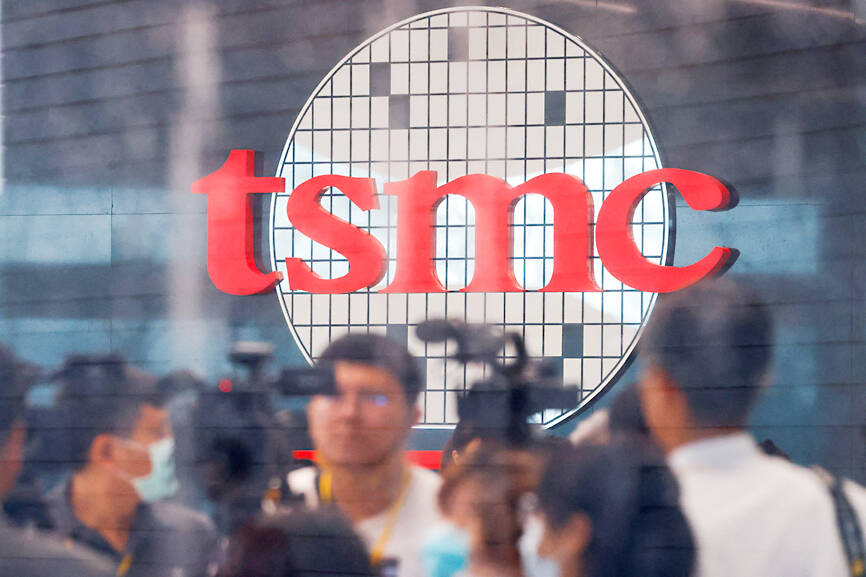Taiwan Semiconductor Manufacturing Co (TSMC, 台積電) yesterday said that its clients prioritize quality above pricing in response to reports that rival Samsung Electronics Co is cutting prices to seize a sizeable share of the future market for chips using an advanced technology still under development.
“[TSMC] clients always focus on product quality,” TSMC chairman Mark Liu (劉德音) said on the sidelines of a government technology advisory conference in Taipei.
Liu’s remarks came as the Financial Times reported earlier this week that Samsung was offering cut-price versions of its latest 2-nanometer prototypes to attract the interest of big-name customers, such as artificial intelligence chip designer Nvidia Corp.

Photo: Ann Wang, Reuters
Both TSMC and Samsung expect to begin producing chips using the 2-nanometer process in 2025, and the Financial Times reported that Qualcomm Inc already intends to shift production of its next-generation high-end mobile chips from TSMC to Samsung’s 2-nanometer process.
The Financial Times also reported that TSMC has already shown the process test results for its “N2” or 2-nanometer prototypes to some of its biggest customers, such as Nvidia and Apple Inc.
The report said Apple is expected to use TSMC’s 2-nanometer process to roll out chips for iPhone 17 production in 2025.
The most advanced technology currently being used by TSMC to make chips is the 3-nanometer process, which entered mass production late last year.
The company is also developing a 1.4-nanometer process to maintain its lead over its peers in the global market, while it is still seeking a venue in Taiwan to build a 1.4-nanometer wafer fab.
In addition to the report by the Financial Times, Nvidia chief financial officer Colette Kress said at a global technology forum organized by UBS Group AG that her company would be glad to find a third party for outsourcing after TSMC and Samsung, but still needed some time to figure it out.
She was thought to be referring to Intel Corp, which has voiced ambitions to overtake Samsung and eventually TSMC in the pure-play foundry market.
TSMC continued to dominate in the global pure-play foundry market with a 57.9 percent share in the third quarter of the year, with Samsung coming in second with a 12.4 percent share, while Intel’s foundry business took just a 1 percent share, market researcher TrendForce Corp (集邦科技) said in a report last week.

CHIP WAR: Tariffs on Taiwanese chips would prompt companies to move their factories, but not necessarily to the US, unleashing a ‘global cross-sector tariff war’ US President Donald Trump would “shoot himself in the foot” if he follows through on his recent pledge to impose higher tariffs on Taiwanese and other foreign semiconductors entering the US, analysts said. Trump’s plans to raise tariffs on chips manufactured in Taiwan to as high as 100 percent would backfire, macroeconomist Henry Wu (吳嘉隆) said. He would “shoot himself in the foot,” Wu said on Saturday, as such economic measures would lead Taiwanese chip suppliers to pass on additional costs to their US clients and consumers, and ultimately cause another wave of inflation. Trump has claimed that Taiwan took up to

A start-up in Mexico is trying to help get a handle on one coastal city’s plastic waste problem by converting it into gasoline, diesel and other fuels. With less than 10 percent of the world’s plastics being recycled, Petgas’ idea is that rather than letting discarded plastic become waste, it can become productive again as fuel. Petgas developed a machine in the port city of Boca del Rio that uses pyrolysis, a thermodynamic process that heats plastics in the absence of oxygen, breaking it down to produce gasoline, diesel, kerosene, paraffin and coke. Petgas chief technology officer Carlos Parraguirre Diaz said that in

SUPPORT: The government said it would help firms deal with supply disruptions, after Trump signed orders imposing tariffs of 25 percent on imports from Canada and Mexico The government pledged to help companies with operations in Mexico, such as iPhone assembler Hon Hai Precision Industry Co (鴻海精密), also known as Foxconn Technology Group (富士康科技集團), shift production lines and investment if needed to deal with higher US tariffs. The Ministry of Economic Affairs yesterday announced measures to help local firms cope with the US tariff increases on Canada, Mexico, China and other potential areas. The ministry said that it would establish an investment and trade service center in the US to help Taiwanese firms assess the investment environment in different US states, plan supply chain relocation strategies and

Japan intends to closely monitor the impact on its currency of US President Donald Trump’s new tariffs and is worried about the international fallout from the trade imposts, Japanese Minister of Finance Katsunobu Kato said. “We need to carefully see how the exchange rate and other factors will be affected and what form US monetary policy will take in the future,” Kato said yesterday in an interview with Fuji Television. Japan is very concerned about how the tariffs might impact the global economy, he added. Kato spoke as nations and firms brace for potential repercussions after Trump unleashed the first salvo of